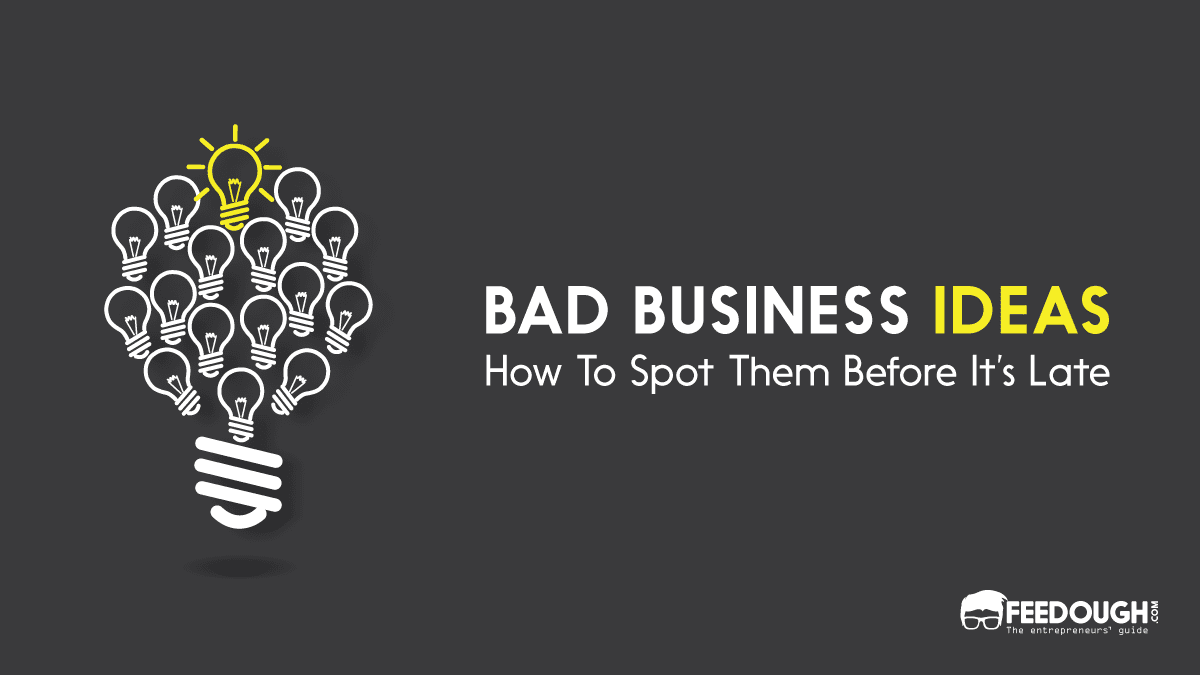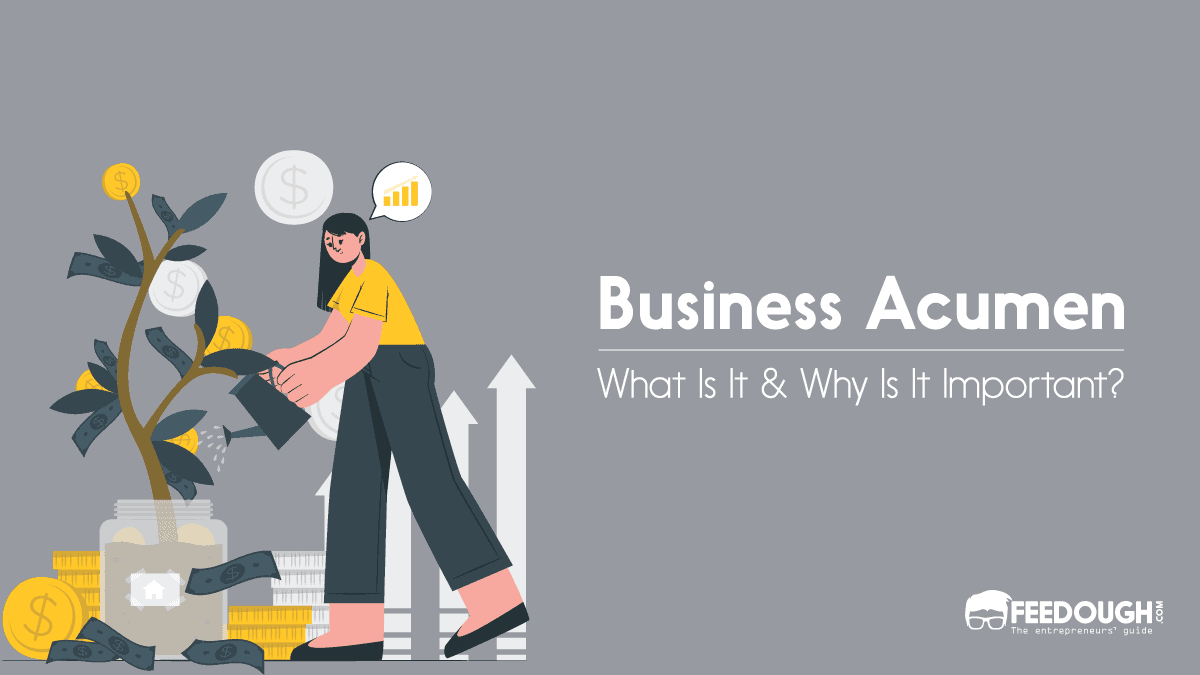Starting a new business is a daunting task, especially if you have a million ideas in mind and don’t know which one to pick. The biggest challenge at this stage is to recognise what will make your idea fail or not worthy of pursuing it further. It is crucial to filter the good from the bad so that you can get started with the right foot.
But how will you identify what’s bad and what is worth pursuing?
What Makes An Idea Good Or Bad?
If you think about it, quite unusual ideas have come to life in the past years. Who thought we could buy ‘n’ number of products sitting in our homes just with a few clicks on your phone. Amazon made it possible and is now one of the biggest ecommerce websites across the world.
But an idea doesn’t need to be entirely unique to work. What matters is that it fulfils the following criteria:
A Good Idea Solves An Existing Worthy Problem
A good idea solves a real problem. It is something that people are already looking for and would be happy to pay for it.
Now, a problem is a difficulty your customer face in completing a job. There can be various issues that might be preventing them from doing the job. A good idea is one that can help remove that difficulty or obstacle easily.
Some reasons why a business idea is not worthy are:
- There’s no problem to solve: You can’t think of a good business idea if you don’t know what the problem is. If there’s no problem, certainly your solution would be redundant. You should not waste your time and money developing something that nobody wants. Innovating for the sake of innovation is useless. It will not lead to anything if people don’t see any value in what you are offering them.
- The problem it solves has already been solved: There might be various reasons behind this. Your competitors might have taken the lead and implemented the solution before you made your move. Or they may have been very successful in offering the solution to their potential customers.
- The problem is not that big: Not every problem is worth solving. Some problems are minor and do not affect people that much. For example, if you want to start an online store that sells different types of highlighters, the need for it among students may be limited.
A Good Business Idea Provides Value To The Customer
Value is what your customers get in return for their money. They should perceive your offering as the best expense or investment to solve a specific problem.
A valuable solution is what:
- Helps the customer in getting their job done
- Solves the problem that poses difficulty in getting the job done
- Provides the benefits the customer expects from the fulfilled job
Some reasons why a business idea is not valuable are:
- The solution does not provide utility to the customers: It doesn’t matter how innovative your idea is; if it fails to offer utility to them, they will have no reason to buy it. The customer wants you to make their life simpler and easier by helping them save time, money or effort spent on other options available in the market. If you are offering them something that does not offer value to them, they will look for other options.
- The solution is not consistent with customer expectations: A good business idea offers a solution that is consistent with customer expectations. People want something that delivers what they expect from it. It shouldn’t make them disappointed or frustrated in the end. If you are not providing someone with what they expected, your idea will fail to win them over.
A Good Business Idea Has A Competitive Advantage
In a competitive market, your idea will have to face a lot of competition. Your product or service must offer something unique and different from what others are offering in the market.
Differentiation is what helps you beat the competition. It gives you a competitive advantage.
Some reasons why a business idea can be termed as a bad idea are:
- The idea isn’t different from what’s already there in the market: If it doesn’t offer something unique to its customers, they will prefer other options. They will not be interested in buying what you are offering them if other similar options are already available in the market.
- The idea has low barriers to entry: If the idea is easy to implement with low investment, it will remain vulnerable to competition. The initial demand for your product or service may be strong initially, but your business will not have a strong stance if someone decides to outsell you in this market. Low barriers also mean that making changes to your strategy would be easy for competitors.
A Good Business Idea Is A Scalable One
The potential of your business lies in scalability. Once you’ve got an idea that is working and has a competitive advantage, it should be easy to grow and scale your business.
A scalable business means you can replicate the offering for a larger market. You do it by adding more branches, hiring more people, increasing production capacity, etc.
A scalable business has a better chance of making it big in a cutthroat competitive scenario.
There is no point in starting a business idea you can’t scale up. The idea must be able to bring the desired results if you make changes in the future.
Reasons why a business idea is not worthy
- The idea doesn’t provide scope for scalability: Some businesses lack the scope of scaling up their operations like expanding geographically, production management etc. If your idea doesn’t offer such opportunities, it will restrict the growth and expansion of your business.
- It’s difficult to scale up operations: Sometimes, it is also difficult to scale up your operations because of the kind of product or service you are offering. If it needs more resources, time, and investment to scale up, it can put your business at risk.
A Bad Business Idea Does Not Have a Clear Target Audience
The target audience is who you are targeting with your product offering. It is wise to find real potential customers rather than make assumptions about who will be interested in buying your product or service.
You must know the target audience for your business idea before making any investment or starting operations. It ensures that you don’t waste your efforts on people who will not be interested in buying it.
A bad business idea:
- Doesn’t define a clear target audience: If you’ve got an idea and don’t know who to focus on, your efforts will be scattered. You may not know where to reach out to them and how to communicate with them. This will only confuse the customer about what kind of product or service you are offering them.
- Doesn’t build the offering based on the target audience: You may have a great idea to offer, but if you’ve not put yourself in your customer’s shoes and built it based on their needs, you are going to fail. This is because your offering will not be able to meet the requirements of these people, and they won’t value your offering.
A Bad Idea Lacks A Market Need
Bad ideas are always driven by just the passion of the owner. They want to start their own business out of sheer interest, not by properly analysing whether this idea will work or not.
A good business idea comes from thorough market research and analysis. It’s all about studying your target customers and understanding their needs thoroughly before presenting them with a solution to fulfil their requirements.
A bad idea, however:
- Isn’t necessarily desired in the market: Sometimes, the idea owner may not have done enough research or work on an assumption, which might prove false once they work towards implementing it. You must test every business idea against the market scenario. You do this by performing market analysis, competitor analysis, trend analysis etc. The chances of success will depend upon how much you know about your customers and what exactly they want from you.
- Is a solution looking for a problem: Instead of focusing on solving a specific problem, bad business ideas build products first, then seek problems that this offering can solve. This approach often backfires as your idea might not be able to fill the demands and needs of your target customers. The perception is: “I like this idea and I am confident it will work” whereas, there should be a more practical approach of “how will this idea work?”.
Bad Ideas Are Not Viable
Viability means that your idea is able to maintain itself, sustain and grow. It refers to the actuality of whether your idea will be profitable or not.
A non-viable idea-
- Isn’t unique: Authenticity of an idea is directly proportional to uniqueness. If you are replicating a business model already in existence, there’s no point in going through all the hassles. You must focus on a unique idea that gives your customers a reason to choose your product or service over the others available in the market.
- Isn’t financially viable: A non-viable idea is not financially viable. It means you won’t be able to generate the desired revenue or break even with this product or service. While coming up with an idea, think about its financial viability. You should be able to sustain for a longer time period by using funds efficiently. You must also analyse the customer acquisition cost properly to generate revenues without spending too much on advertising and marketing. Consider all angles like human resources, finance, infrastructure etc., before taking the plunge.
- Isn’t profit-oriented: Your business, ultimately, should bring profits so you can keep it running and make changes as per the market demands. Your idea may look good on paper, but if it isn’t profitable enough, you need to change it before taking it further into the implementation stage. You can assess an idea for profitability by considering the break-even point and profit margin. A break-even point is the amount of sales that will cover the cost of products or services. You can calculate it by considering your fixed and variable costs. Profit margin is the revenue minus all costs and expenses. Make sure you have decent profit margins from the start or have a scope in the future so that you can generate enough funds to expand your business.
- Is not time-efficient: A non-viable idea is not time efficient. You might spend more time and resources than necessary before you can generate revenue with it. Sometimes, the idea may appear brilliant but might take too much time to launch. You need to consider your strengths and limitations while selecting an idea that fulfils the market demands. Don’t lose time on an idea that would take more time to bring into practice.
- Isn’t scoped properly: The execution plan, however good it may sound, can fail due to a lack of proper scoping. All the resources you will need to run your business, the employees you need to hire, and the technologies you will be using are part of scoping. If you are not sure about all these aspects, you need to find out the answers before finalising your idea.
- Is based on assumptions: It’s okay to have assumptions, but they must be the right ones. Assumptions which are often based on gut feeling, tradition, or subjective thinking can lead to failure. You must have detailed market research before finalising your idea that includes figuring out the need of target customers, their buying behaviour, and lifestyle choices and preferences.
- Isn’t legally possible: Your idea must be legally feasible if you want to implement it successfully. Ask yourself this question- “Can I execute my business plan as per the government law?” You also need to think about your intellectual property rights and whether you will have any problems regarding labour laws.
You can check the viability of an idea by answering a few questions like these-
- How much money will you need to start and scale up your business? When do you require how much amount?
- What is the rate at which your cost of goods or services will reduce with increased production or sales?
- Is your target audience profitable enough to sustain the business in future, if not now?
- Will you be able to retain your customers without making any changes in your product or service?
- What are the legal requirements to run this business idea?
- Does your idea align with the current market trend and customer expectations?
- How much time will it take for customers to see positive results or return on investment (ROI)?
A Bad Business Idea Does Not Fit Your Strengths
Before finalising an idea, you should analyse your strengths and weaknesses. If you have the required skills to take a project forward, you should go for it. If you lack any of them or have weaknesses that can greatly impact the execution of your idea, then avoid it, as it will be a big problem for you.
Start with SWOT analysis. It is a simple way to understand your capabilities and identify potential weaknesses. SWOT stands for strengths, weaknesses, opportunities and threats associated with it. It analyses performance from four perspectives: internal factors (strengths and weaknesses) and external factors (opportunities and threats). Make sure you consider all these angles while coming up with an idea.
Bottom-Line?
Ideas are a dime a dozen, but not every one of them is worth pursuing. Many factors make an idea non-viable, and you need to find out whether your business idea falls under the same category or not. The more time you invest in understanding this before launching your startup, the better it will be for you financially.
But make sure you can differentiate a good idea from a bad one. Your idea should be customer-oriented, scalable, resource-efficient, and profitable when executed. If you are not sure about any of these aspects with your business idea, it would be better for you to wait until you find an idea that is worthy!
Go On, Tell Us What You Think!
Did we miss something? Come on! Tell us what you think of this article on how to spot a bad business idea in the comments section.
A startup consultant, digital marketer, traveller, and philomath. Aashish has worked with over 20 startups and successfully helped them ideate, raise money, and succeed. When not working, he can be found hiking, camping, and stargazing.









